|

The Walnut Street Center is a workshop for the mentally disabled. Job
coaches work with the mentally disabled, giving them training, guidance
and encouragement. This panoramic view of the workshop was created from four handheld
photos stitched together.
 Helen, one of the job coaches, prepares for the workday. Job coaches
maintain work tallies of which person completed which batch of
work. Mornings are one of the few quiet times in the workshop for the
staff. Once individuals start to arrive, the workshop buzzes with
activity.
Helen, one of the job coaches, prepares for the workday. Job coaches
maintain work tallies of which person completed which batch of
work. Mornings are one of the few quiet times in the workshop for the
staff. Once individuals start to arrive, the workshop buzzes with
activity.
 Helen (left) and Pat, one of the individuals, greet in the morning.
Helen (left) and Pat, one of the individuals, greet in the morning.
 Bob relaxes before the start of the workday.
Bob relaxes before the start of the workday.
 Denise sorts letters into groups of three. She is using a cardboard
counting tray to assist in organizing the letters three at a time.
Denise sorts letters into groups of three. She is using a cardboard
counting tray to assist in organizing the letters three at a time.
 Helen works closely with Chris. Some individuals require close
mentoring to ensure that they remain interested in their task and to
ensure that they complete the work correctly.
Helen works closely with Chris. Some individuals require close
mentoring to ensure that they remain interested in their task and to
ensure that they complete the work correctly.
 Chris and Ray stuff letters into envelopes. Other kinds of work at the
center include letter folding, letter collating, letter counting,
envelope labeling, and envelope sealing.
Chris and Ray stuff letters into envelopes. Other kinds of work at the
center include letter folding, letter collating, letter counting,
envelope labeling, and envelope sealing.
 John looks up from his collating work. Specific kinds of work are given to
people depending on their skill levels.
John looks up from his collating work. Specific kinds of work are given to
people depending on their skill levels.
 Cheryl waters plants at the Tufts University campus weekly. Some
individuals value their opportunities to participate in off-site work.
It's a chance to learn new tasks, and a chance to bolster their
self-esteem and self-confidence. On the other hand, other individuals
prefer the routine and camaraderie of working at the center.
Cheryl waters plants at the Tufts University campus weekly. Some
individuals value their opportunities to participate in off-site work.
It's a chance to learn new tasks, and a chance to bolster their
self-esteem and self-confidence. On the other hand, other individuals
prefer the routine and camaraderie of working at the center.
 After watering plants at Tufts, Pat has lunch at a nearby food court.
One of the perks of off-site work is the off-site lunch.
After watering plants at Tufts, Pat has lunch at a nearby food court.
One of the perks of off-site work is the off-site lunch.
 Cindy (left), seen here with her job coach Maureen, answers phones at
the Mass Department of Mental Retardation.
Cindy (left), seen here with her job coach Maureen, answers phones at
the Mass Department of Mental Retardation.
 Maria helps herself to another batch of work.
Maria helps herself to another batch of work.
 Maria is ready to start work on a set of envelopes to be sealed.
Maria is ready to start work on a set of envelopes to be sealed.
 In addition to working at the center as seen here, Dan also works at
Borders bookstore. He prepares unsold books, newspapers and magazines
for return to the publishers.
In addition to working at the center as seen here, Dan also works at
Borders bookstore. He prepares unsold books, newspapers and magazines
for return to the publishers.
 Despite being legally blind, Robert (left) sees well enough to complete
folding jobs. Robert also works the reception desk for the center.
Despite being legally blind, Robert (left) sees well enough to complete
folding jobs. Robert also works the reception desk for the center.
 Doris waits for work from the job coaches. Doris is one of two people
in wheelchairs who works at the center.
Doris waits for work from the job coaches. Doris is one of two people
in wheelchairs who works at the center.
 Bob folds prayer books at St. James church, just in time for Easter Sunday.
Bob folds prayer books at St. James church, just in time for Easter Sunday.
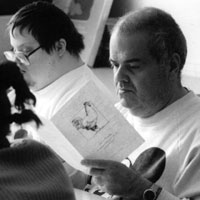 Michael takes a break from folding to read one of the prayer books.
Michael takes a break from folding to read one of the prayer books.
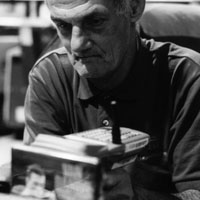 Bill scans and labels videos at Best Buy. Learning new tasks is one of
the challenges of off-site jobs.
Bill scans and labels videos at Best Buy. Learning new tasks is one of
the challenges of off-site jobs.
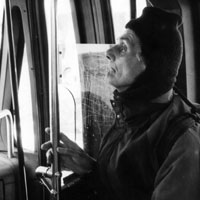 Bill on the bus, returning to the center after working in Best Buy in the morning.
Bill on the bus, returning to the center after working in Best Buy in the morning.
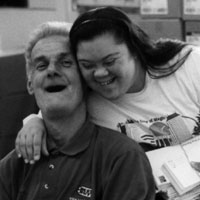 Bill & Aida share a laugh at the workshop. Interpersonal relationships is
one of the skills taught at the center.
Bill & Aida share a laugh at the workshop. Interpersonal relationships is
one of the skills taught at the center.
 Kathy demonstrates how to make precise folds.
Kathy demonstrates how to make precise folds.
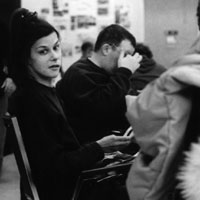 Heather looks up from her work. The eventual goal of the center is for
the individuals to find independent work and independent living in their
communities.
Heather looks up from her work. The eventual goal of the center is for
the individuals to find independent work and independent living in their
communities.
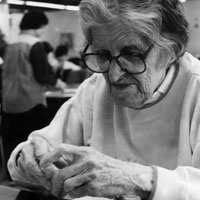 Cathy applies mailing labels to envelopes. Some of the work at the
center requires more manual dexterity than other work. Tasks are matched
with individual's skills.
Cathy applies mailing labels to envelopes. Some of the work at the
center requires more manual dexterity than other work. Tasks are matched
with individual's skills.
 Mary nods off at her chair. While individuals are encouraged to be as
productive as they can, they're allowed the freedom to work as little or
much as they want.
Mary nods off at her chair. While individuals are encouraged to be as
productive as they can, they're allowed the freedom to work as little or
much as they want.
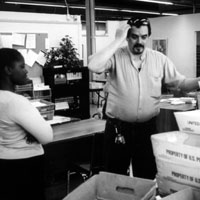 Staff members Sarah (left) and Reuben gather up completed work at the
end of the day. Reuben manages the work contracts with outside
clients. He priorities the work to be completed to meet the deadlines
of the clients.
Staff members Sarah (left) and Reuben gather up completed work at the
end of the day. Reuben manages the work contracts with outside
clients. He priorities the work to be completed to meet the deadlines
of the clients.
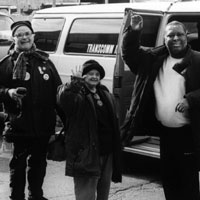 Bob, Betty and Marion going home by van. Some individuals commute to
the center by car or by public transportation.
Bob, Betty and Marion going home by van. Some individuals commute to
the center by car or by public transportation.
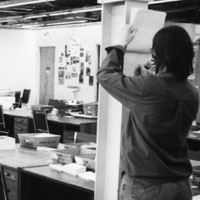 Helen updates the work tally after everyone else leaves. Once again,
the workshop is quiet until tomorrow.
Helen updates the work tally after everyone else leaves. Once again,
the workshop is quiet until tomorrow.
Tom Louie
tom.louie@earthlink.net
May 15, 2002
| 








